Key takeaways:
- Plastic waste significantly impacts marine ecosystems and human health, prompting the need for awareness and action.
- Individual efforts, such as using reusable bags and opting for bulk purchases, can contribute to reducing plastic waste and inspire others.
- Environmental education is essential for fostering a proactive approach to sustainability and understanding the broader implications of consumer choices.
- Long-term goals for sustainability involve supporting eco-friendly businesses and promoting community awareness about environmental issues.
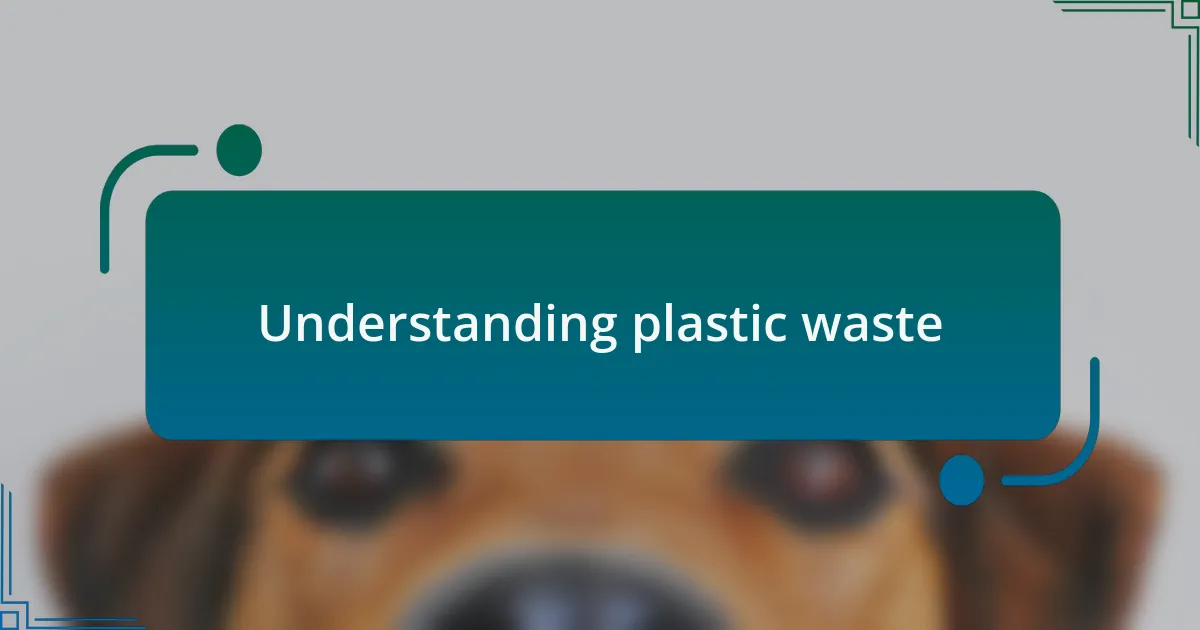
Understanding plastic waste
Plastic waste is more than just an eyesore; it’s a pervasive problem that affects our environment in profound ways. I remember walking along a beach, and instead of enjoying the natural beauty, I was struck by the sight of plastic littering the sand. How could something so convenient to use become such a toxic staple in our lives?
When we think about plastic, it’s easy to overlook its environmental impact. Did you know that a significant portion of the plastic we use ends up in our oceans? Each year, millions of tons of plastic debris enter the marine ecosystem, harming wildlife and disrupting delicate habitats. I often reflect on the images of seabirds mistaking plastic for food, which drives home the reality of plastic pollution all too vividly.
Understanding plastic waste involves acknowledging not just its quantity but its lifecycle. From production to disposal, plastic releases harmful chemicals that can seep into our soil and water. It’s alarming to consider; every piece of plastic ever made still exists in some form today. What legacy are we leaving behind when we choose convenience over sustainability? That’s a question each of us must ponder as we navigate our daily choices.
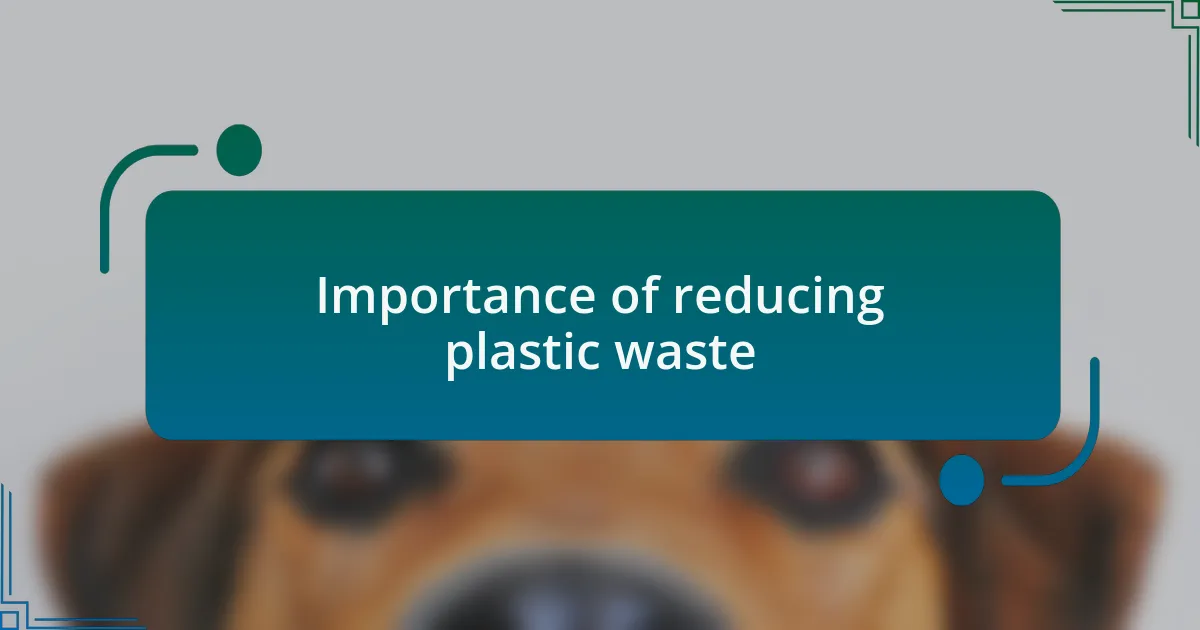
Importance of reducing plastic waste
Reducing plastic waste is crucial not only for the health of our environment but also for our own well-being. When I think about how much plastic my household generates, it’s a bit overwhelming. Have you ever stopped to consider how plastic affects our own bodies? Microplastics have been found in human tissue, raising serious questions about the long-term impacts on our health.
The consequences of plastic waste are evident in both land and marine environments. I vividly recall a hiking trip through a protected nature reserve, only to find plastic bags tangled in the bushes. That sight frustrated me deeply; it felt like a betrayal of nature. Each piece of plastic disrupts ecosystems and jeopardizes the survival of countless species. Isn’t it our responsibility to protect these precious habitats for future generations?
Moreover, reducing plastic waste can foster a sense of community and shared responsibility. Think about the last time you attended a beach cleanup or a recycling event. It’s a rewarding experience to work alongside like-minded individuals who share your concerns for the planet. Together, we can create a ripple effect that inspires others to rethink their consumption habits. How empowering is it to know that even small changes in our daily routines can lead to lasting positive impacts?
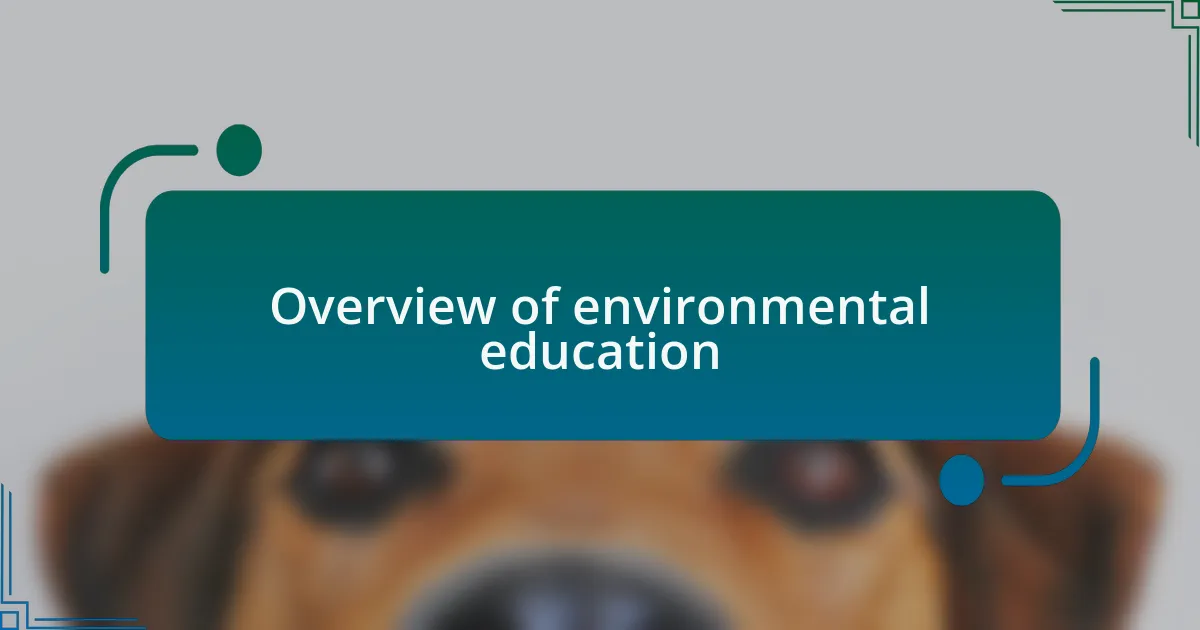
Overview of environmental education
Environmental education is essential in fostering a deeper understanding of the challenges our planet faces, particularly regarding plastic waste. I always find it fascinating how awareness can spark change; when I attended an environmental workshop, the impact of single-use plastics became so clear. It was a revelation, realizing that even small actions have significant consequences.
This field focuses on developing critical thinking and problem-solving skills related to environmental issues. I remember sitting with a group of friends, engaging in discussions about sustainable alternatives to plastic in our daily lives. Those conversations not only educated us but also inspired a commitment to make informed choices that benefit the environment.
Ultimately, environmental education encourages individuals to adopt a proactive stance toward protecting our planet. Have you ever wondered how your daily habits could change if you understood the broader implications of your choices? I know my journey into reducing plastic waste began with education, leading me to implement practical solutions in my life. Through knowledge and awareness, we pave the way for a more sustainable future.
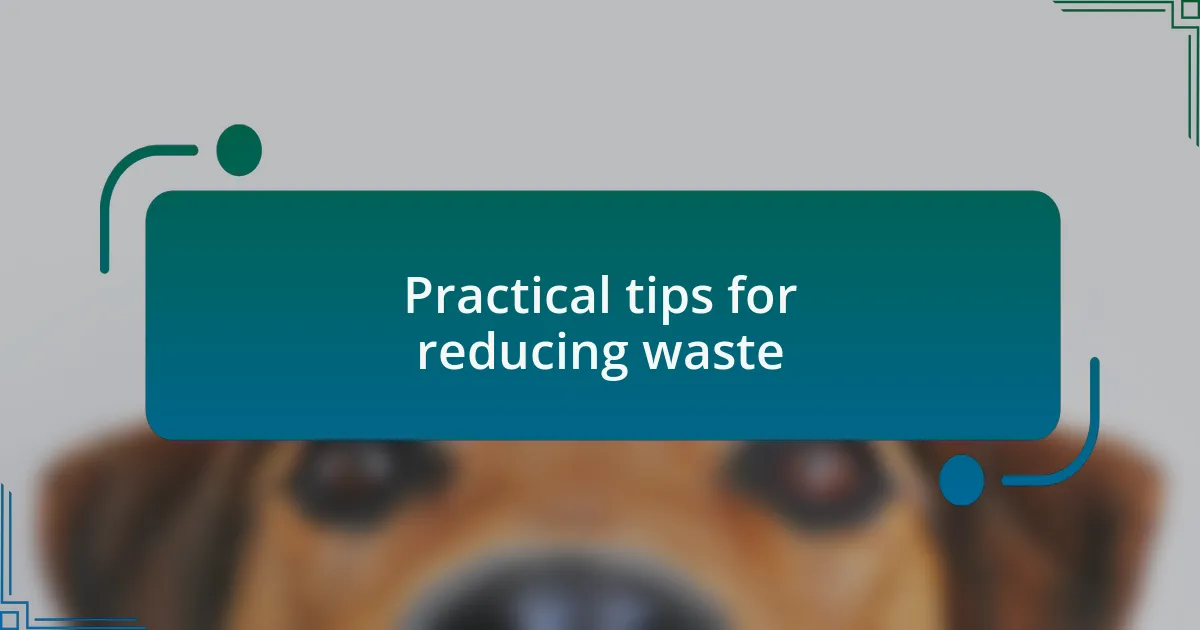
Practical tips for reducing waste
One of the simplest steps I’ve taken is to carry a reusable bag everywhere I go. I remember the first time I forgot my reusable bag at home—I felt a pang of disappointment at having to opt for a plastic one instead. Since then, I’ve made it a habit, and it’s fascinating how this small change contributes to reducing plastic waste significantly. Have you ever noticed how many single-use bags accumulate in your home?
Switching to a refillable water bottle was another game-changer for me. Initially, I struggled with the convenience of buying bottled water, but now I see the benefits clearly. I find it quite empowering to know that I’m not only saving money but also preventing countless plastic bottles from ending up in landfills. Isn’t it satisfying to sip water from a stylish, eco-friendly bottle instead of plastic?
In my kitchen, I’ve started using beeswax wraps instead of plastic wrap for food storage. The first time I unwrapped my lunch with a colorful beeswax wrap, I felt a sense of pride knowing I was making a more sustainable choice. It’s amazing how these small adjustments in our routines can create a ripple effect, inspiring others around us to think twice about their own habits. Have you ever noticed how quickly friends can be influenced by our choices?
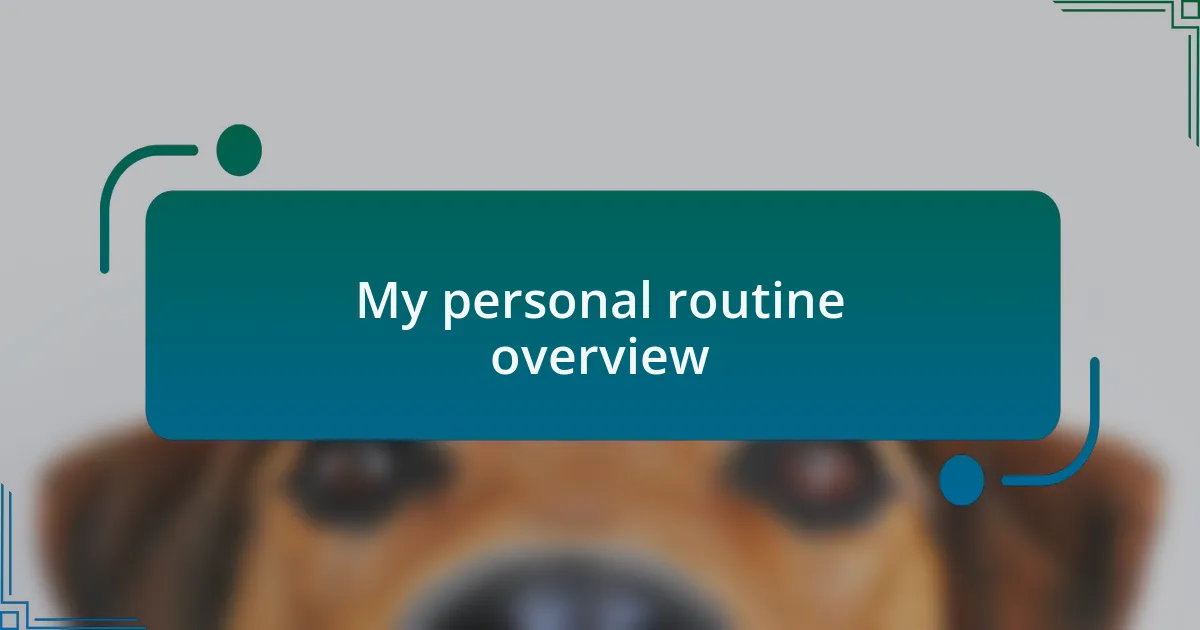
My personal routine overview
One early morning, I realized how essential it is for me to plan my meals and groceries carefully. By creating a detailed shopping list, I significantly reduced impulsive purchases that often lead to unnecessary plastic packaging. Have you ever felt that little thrill of checking off every item? It’s not only satisfying but also makes me more conscious of what I bring home.
I also began composting my food scraps, which was an eye-opening experience. The first time I opened my compost bin and saw what had once been waste transformed into rich soil, I felt a deep connection to the cycle of nature. Isn’t it rewarding to see how we can turn our leftovers into something beneficial instead of contributing to landfill waste?
In addition, I’ve started to opt for products with minimal or no packaging whenever possible. One day, I walked into a zero-waste store, and it felt like a revelation. The thrill of filling my own containers with grains and soap was invigorating. Have you ever felt that joy of finding solutions that align with your values? These choices remind me every day that my actions, no matter how small, truly matter.
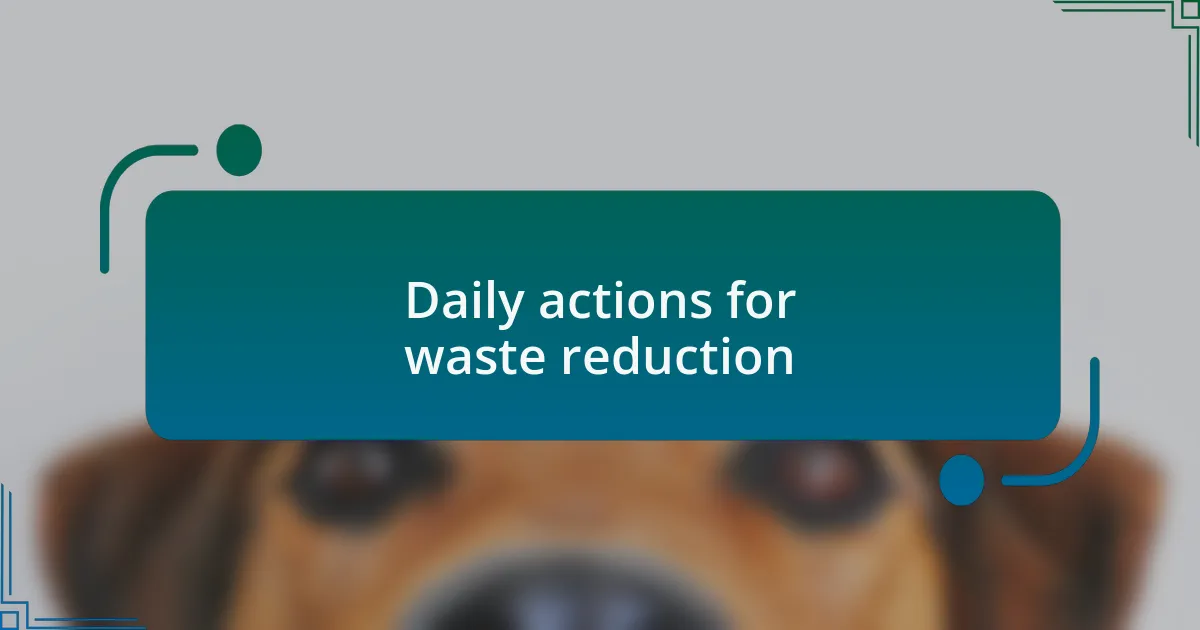
Daily actions for waste reduction
Every morning, I make it a habit to carry a reusable water bottle and cloth shopping bags with me. I still remember the day I forgot my bags at home and was forced to take a plastic one at the store. The disappointment hit hard; it reinforced my commitment to avoid single-use plastics. Have you experienced that sinking feeling when you realize a small oversight can lead back to uninspiring habits?
As part of my routine, I’ve also embraced buying foods in bulk. Once, while visiting a local farmer’s market, I was struck by the sight of vibrant, loose veggies laid out without any packaging. It was a game-changer! I filled my bags with fresh produce, chatting with the vendor about his sustainable practices. Engaging in this way not only reduces plastic waste but also fosters community connections. Isn’t it amazing how small choices can lead to significant relationships and lifestyle shifts?
In my quest to minimize waste, I’ve started to repair items in my home rather than tossing them out. Just last week, I dusted off my sewing kit to patch up a beloved old pair of jeans. The satisfaction of mending something instead of discarding it was profound. It sparked thoughts about our culture of disposability. Don’t you think it’s time we redefined what it means to take care of our belongings?
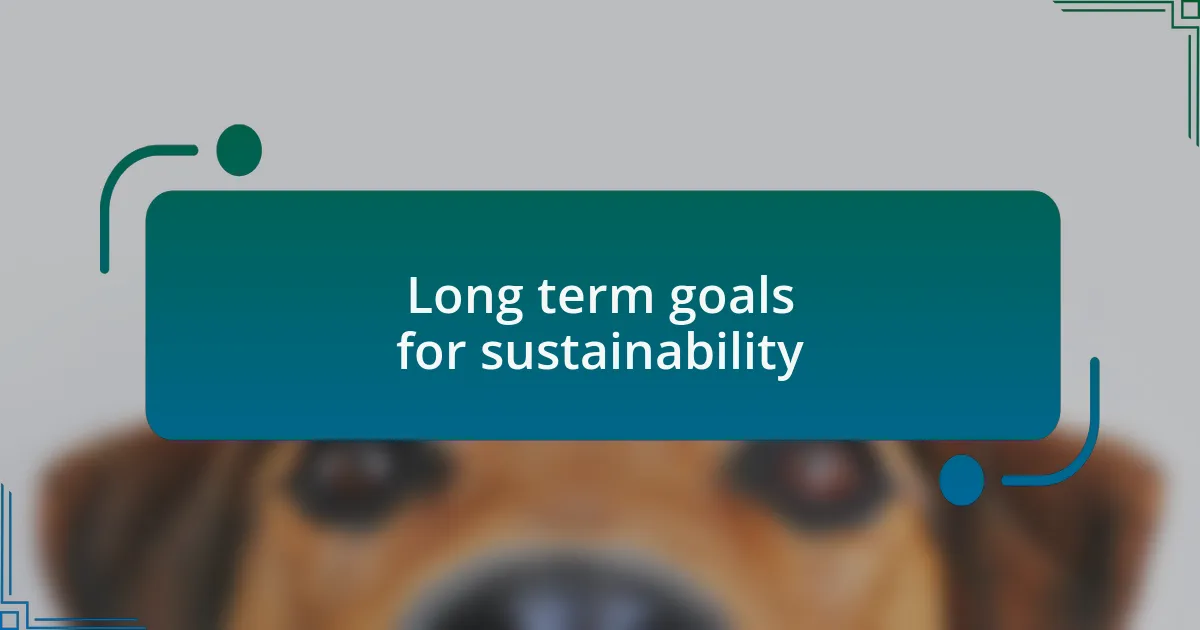
Long term goals for sustainability
Long-term sustainability goals often require a shift in mindset and lifestyle. I remember attending a workshop where the facilitator emphasized the importance of not just reducing waste but also embracing a zero-waste philosophy. It resonated deeply with me. What if, instead of merely minimizing our plastic use, we aimed to eliminate it entirely from our lives? This idea has propelled me to consider how I can significantly transform my habits over time.
One of my ongoing goals is to support businesses that prioritize sustainability. I often reflect on a small, local café that uses compostable straws and containers. Visiting places like that makes me feel part of a larger movement, where every purchase is a vote for the planet. Have you ever thought about how your spending choices can impact the environment in the long run? By consciously selecting eco-friendly options, I believe we can foster a marketplace that values sustainability and pushes the boundaries of innovation.
Additionally, I’ve been working on my community’s goal of promoting education around environmental issues. It dawned on me during a conversation with my neighbor, who was unaware of the effects of plastic pollution. The potential to create awareness about sustainable practices really ignited my passion. Imagine if every neighborhood shared resources and knowledge—how transformative that could be for our environment! This long-term objective is not just about personal change; it’s about inspiring collective action.